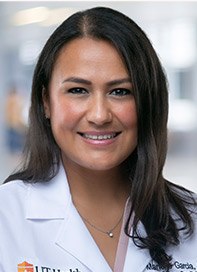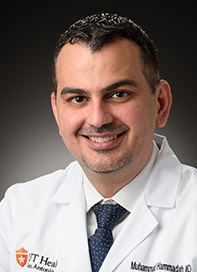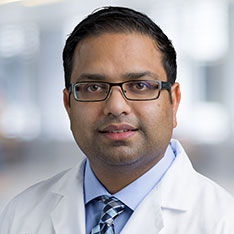San Antonio Cardiology Care
Medical conditions of the heart and vascular system require immediate attention. You may not know you have a cardiovascular condition unless a doctor diagnoses you or until you have a serious event like a heart attack or stroke. You may be able to manage your condition with medications or lifestyle changes.
In many cases, you’ll need the expertise of a surgeon and a personal treatment plan to restore your quality of life.
Cardiovascular Treatment You Trust
University Health’s cardiovascular team is the only one of its kind in South Texas. Our team consists of:
- Emergency department physicians
- Interventional cardiologists
- Cardiothoracic surgeons
- Vascular surgeons
- Nurses
- Cardiovascular technologists
We provide comprehensive heart and vascular care – including testing and diagnosis, nonsurgical treatments, minimally invasive procedures and complex interventional heart surgeries using state-of-the-art technologies.
Our highly skilled San Antonio cardiologists and cardiac surgeons are available 24/7 to provide advanced cardiovascular treatments when you or a loved one needs help. Whether it’s a planned surgery or an unexpected event, we’re here to perform life-saving and life-extending treatments.
Non-Surgical Heart Treatments
We’re proud to be at the forefront of heart care. Our goal is to use less invasive, nonsurgical treatments when possible.
Heart Catheter Procedures
For example, we perform left atrial appendage closures using the LARIAT® procedure. Also, our cardiologists are highly skilled at implanting the Watchman device to help patients who have atrial fibrillation (AFib). Both are nonsurgical treatments that help reduce stroke risk in patients with AFib who can’t take blood-thinning medications.
LARIAT and Watchman
Every year, we perform hundreds of heart catheter procedures. We enable men, women and children to resume their normal activities and restore them to a better quality of life. Many patients are helped with various types of minimally invasive, catheter ablation procedures for atrial fibrillation, ventricular tachycardia and other complex arrhythmias.
We also extract a number of arrhythmia devices.
From ablations and angioplasty to stenting and catheterization, you’re in expert hands and have the advantage of accessing the latest technology dedicated to delivering superior cardiovascular care.
We also perform the convergent procedure, which combines surgery and catheter ablation to treat atrial fibrillation.
TAVR
Transcatheter aortic valve replacement (TAVR) was developed for patients with aortic stenosis who have few alternatives to alleviate their symptoms.
Surgical Heart Treatments
Our heart surgeons are known for their constant pursuit of the latest techniques and technology in surgical heart care.
Cardiologists, interventional cardiologists and cardiothoracic surgeons from UT Health San Antonio bring their surgical expertise to the University Health Cardiovascular Center and the Heart Valve Clinic.
We’ve built a strong partnership with UT Health San Antonio’s Division of Vascular and Endovascular Surgery to deliver the most advanced endovascular techniques, as well as traditional vascular treatment options.
Minimally Invasive
Spend less time in the hospital and have a quicker recovery when you choose a minimally invasive heart procedure at University Health in San Antonio. Our heart team can treat a number of heart conditions with minimally invasive options and implants.
Alcohol Septal Ablation
Alcohol septal ablation is a non-surgical procedure that treats patients with hypertrophic cardiomyopathy (HOCM), a condition in which the heart muscle is abnormally thick. Because of HOCM, the septum may push into the left ventricle and potentially restrict proper blood flow.
Alcohol septal ablation improves the blood flow through the heart and out to the rest of the body. This treatment helps to reduce symptoms such as fatigue and shortness of breath that hypertrophic cardiomyopathy patients might have. Getting treatment will often minimize the likelihood of future heart problems as well.
ASD/PFO/VSD Closure
Percutaneous closure of atrial septal defects (ASD), patent foramen ovale (PFO), and percutaneous closure of ventricular septal defect (VSD) are minimally invasive procedures. A small device is inserted through the vessels in the groin to close an abnormal connection (“hole in the walls”) between the different chambers of the heart.
Convergent Procedure
The convergent procedure is the first of its kind. It combines minimally invasive heart surgery and catheter ablation to treat atrial fibrillation.
Left Atrial Appendage Occlusion (Watchman)
This one-time procedure is used to prevent strokes related to atrial fibrillation (A.Fib), a type of irregular heartbeat. A percutaneous implant will permanently seal the left atrial appendage, where more than 90% of strokes related to atrial fibrillation start.
Watchman is an option for patients who cannot tolerate blood thinners or are at an increased risk of bleeding from blood thinners.
Transcatheter Aortic Valve Replacement (TAVR)
TAVR is an innovative catheter-based procedure that replaces the diseased aortic valve in patients with aortic valve stenosis. Aortic stenosis is a condition in which the valve has restricted opening or “narrowing”, often due to calcium buildup on the valve leaflets. This reduces blood flow from the heart to the rest of the body.
Transcatheter Mitral Valve Repair (MitraClip)
There are multiple mitral valve interventions that treat mitral valve “leaking” or regurgitation. Patients with mitral regurgitation who are considered high-risk for open-heart surgery may benefit from these procedures.
Transcatheter Pulmonic Valve Replacement
Patients with a failing pulmonary valve conduit who are not candidates for open-heart surgery might benefit from this transcatheter pulmonary valve replacement option.
Transcatheter Tricuspid Valve Repair (TEER/Triclip)
Treatment of tricuspid regurgitation with transcatheter edge-to-edge repair (TEER) has emerged as a safe and potentially effective therapy for patients with tricuspid regurgitation. This treatment is offered by our valve team, who will do a comprehensive evaluation of your valve condition and determine if this minimally invasive treatment is suitable for you.
Transcatheter Tricuspid Valve Replacement (TTVR)
This minimally invasive procedure is used to replace a damaged or leaky tricuspid valve using a small incision in the groin area, without the need for open heart surgery, was recently approved in the United States. Our team is the first in South Texas to bring this cutting-edge treatment to the region.




